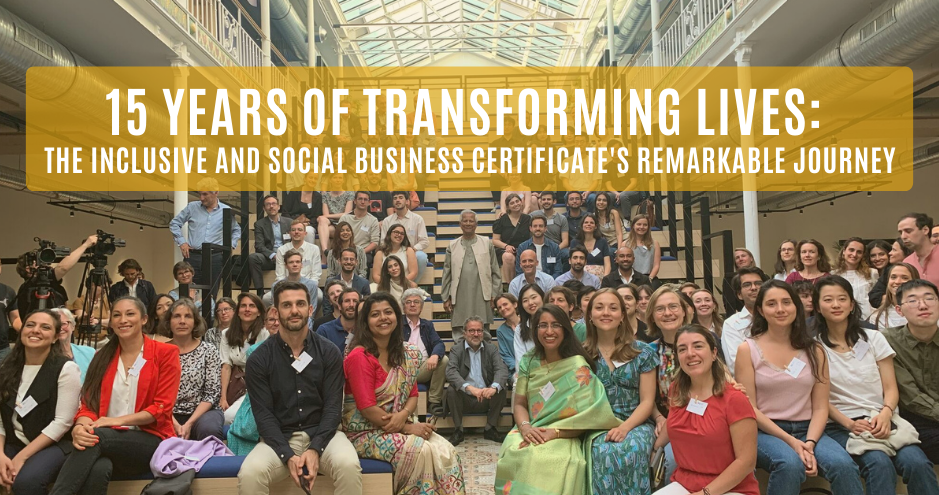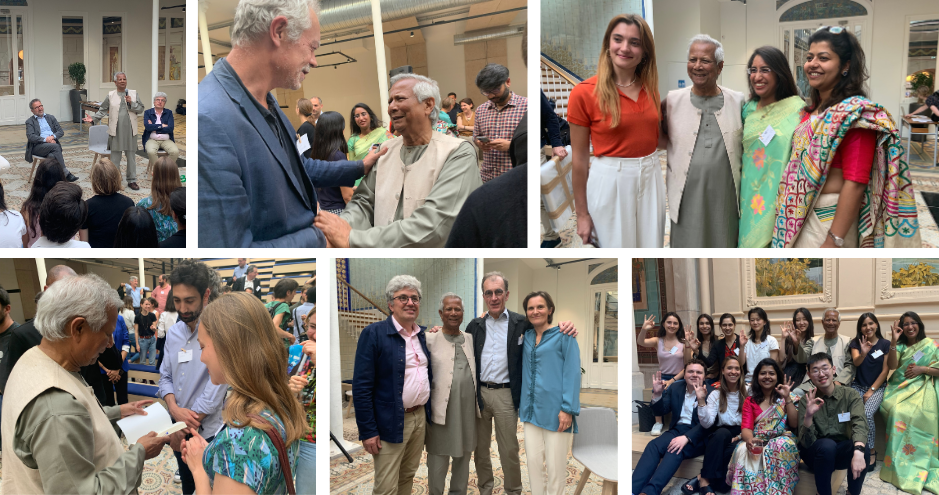15 years of transforming lives: The Inclusive and Social Business Certificate's remarkable journey
This year marks the 15th anniversary of the HEC Paris Inclusive and Social Business Certificate, a significant milestone in the world of social business. For the occasion, HEC Paris organized a roundtable discussion featuring key players and visionaries in the field, including Nobel Peace Prize laureate Professor Muhammad Yunus.

Hosted at the Albert School in Paris, the event celebrated not only the program's longevity but also its profound impact on society. HEC Paris Associate Professor Bénédicte Faivre-Tavignot, one of the driving forces behind the certificate, kicked off the discussion by reflecting on the program's inception and its overall goal of exploring how business can have a positive impact on people's lives. She echoed what Professor Yunus shared during the early days: "There are two ways to make business – one is to make money, and the other is to do good for people."
The birth of a vision
The journey of the Inclusive and Social Business Certificate began 15 years ago with a vision to empower vulnerable communities. “Our aim has been to foster a mindset and culture that prioritizes the 'S' in ESG among our students, and ultimately to encourage the business community to take an active role in addressing social challenges," explained Bénédicte Faivre-Tavignot. The program initially started thanks to the launch of the Social Business Chair / Entreprise & Pauvreté in 2008, with the support of key figures like Laeticia d’Ornano and Danone, thanks to Emmanuel Faber.
The certificate's journey has been a testament to the power of collaboration, and it has recently embarked on a new adventure: the Inclusive Economy Center, led by HEC Paris Associate Professor Marieke Huysentruyt, a renowned researcher in behavioral economics.
Professor Yunus, the catalyst of this whole Inclusive and Social Business Certificate journey
“The purpose of this ongoing adventure has been to explore how business can do good to people, obviously looking at the most vulnerable ones, and how to give them access to essential goods and services, and giving them access to decent work,” stated Bénédicte Faivre-Tavignot. And this 15-year journey wouldn’t have been possible without the involvement of Professor Muhammad Yunus.
Professor Yunus has indeed been an unwavering presence, inspiring change and driving awareness. His relentless efforts to mobilize business leaders worldwide have been instrumental in shaping the program's evolution. All the speakers at the roundtable expressed their gratitude for his pivotal role in the program's success.
The impact of collaborations
The roundtable highlighted the power of collaborations between the academic world and businesses. Representatives from renowned companies such as Danone, Schneider Electric, and Renault shared their appreciation for the program's impact on their organizations over the years. These collaborations have enabled them to adopt a more socially responsible approach to business, resulting in meaningful changes.
Martin Hirsh, President of the Institut de l'Engagement and Executive Vice-Director of Galileo Global Education, a key figure in the program's early days, reminisced about how it all began 15 years ago. The program's unique blend of hands-on fieldwork with the Action Tank Social & Business and academic research with HEC Paris was a groundbreaking concept, emphasizing the importance of assessing the consistency and performance of social business projects. He underlined the program's role in inspiring students to find purpose in their lives, challenge dominant economic models, and explore alternative solutions.
Gilles Vermot Desroche, Chief corporate Citizenship Officer at Schneider Electric, historic partner for the adventure, shared his perspective on the transformational impact of both the program and his interactions with Professor Yunus on his own thinking and approach to business. Many social initiatives and projects at Schneider Electric have had tangible results, but most importantly they facilitated the transfer of skills to people in need. “We never envisioned that our primary responsibility should be addressing the issue of those without access to electricity. Our duty lies in comprehending how we can bring about this change. Beyond technology, innovation, or products, our responsibility is to nurture local entrepreneurship and understand the transformative impact that access to electricity can have on people's lives.” Gilles also spoke about the importance of mentorship as it helps people become more ambitious, and the need for business leaders to engage in deep, meaningful partnerships with academics.
“We never envisioned that our primary responsibility should be addressing the issue of those without access to electricity. Our duty lies in comprehending how we can bring about this change. Beyond technology, innovation, or products, our responsibility is to nurture local entrepreneurship and understand the transformative impact that access to electricity can have on people's lives.”

Impact in action with a powerful alumnus testimonial
Students of the Certificate remain its best ambassadors. Yannis Zaccharie Bekhti, a former student, shared an inspiring testimonial about his post-certificate journey, focusing on three key takeaways from the Certificate:
- Don’t be afraid to challenge the status quo and to push for innovative solutions: “It’s okay to be divergent”.
- Be creative and invent your own solution when no solution is available.
- Be the change you want to see: “Be humble but at the same time, be ambitious enough to take some risks.”
These key learning points led him to create a movie production company when no one wanted to produce his stories. Most recently, Yanis also launched CLIMAP, the Climate Investment, Mobilization and Access Partnership, an NGO that aims to facilitate climate finance in Africa, Asia and the Middle East, where those investments are the most needed.
Professor Muhammad Yunus: Lessons on poverty and social entrepreneurship
The roundtable was also the opportunity to feature an insightful conversation with Professor Muhammad Yunus, who was awarded the prestigious Nobel Peace Prize in 2006 with Grameen Bank. Professor Yunus is renowned for his pioneering work in microcredit and social entrepreneurship. He started by underlining the misconception that poverty is the fault of the poor, emphasizing that it is a result of systemic societal issues and lack of opportunities. He shared stories of working with impoverished individuals and the importance of unlocking their potential by overcoming layers of fear and insecurity.
Starting with health issues in Bangladesh
Professor Yunus explained that the Grameen Bank has been focusing on healthcare right from the start, always with an innovative angle. Why? Because sick people are a key priority, especially when it comes to the health of children. They started with toilets, as no toilets means the proliferation of disease. “One of the rules we made at Grameen Bank was to ask people willing to join Grameen Bank to dig a hole and use it rather than going out anywhere they want.” People were reluctant at first but they knew they needed to do it in order to get their money. Then, Grameen Bank granted toilet loans so people could have their own toilet. This meant a lot for women and helped them regain their dignity. Professor Yunus explains that “Women don't hug in Bangladesh, but they do when they see me because we saved them from the torture of waiting until darkness.” The Bank also created a company that produces toilets in the village, so that carrying costs are eliminated.
"Women don't hug in Bangladesh, but they do when they see me because we saved them from the torture of waiting until darkness"
Expanding the impact globally
It doesn’t stop there. With Grameen Bank, they created healthcare centers, hospitals, even a hotel type of facility next to the hospital so people can come and go to their appointments whenever needed instead of staying several days in the hospital and paying the high price. They also launched a renowned nursing college to make sure Bandagleshi don’t need to go overseas to get cured. Lately, they have been working on a digital healthcare system where people get all the health services through an app that makes healthcare accessible and convenient, especially for pregnant women. “We want to create a complete healthcare service so that when people leave the hospital, the hospital follows them to their door steps, wherever they are.”
Sharing the meaningful story of the Grameen Bank in Bangladesh is only the tip of the iceberg of Professor Yunus’ actions. His influence has extended far beyond Bangladesh and the healthcare sector. Today, people throughout the world, from all generations and all backgrounds keep on being inspired by his actions.
“Get excited about the multitude of problems in the world, view them as opportunities for innovation, and approach them from different angles!”
To conclude on these impactful projects, Professor Yunus encouraged the audience to view challenges as opportunities for innovation, problem-solving and creativity. “Get excited about the multitude of problems in the world, view them as opportunities for innovation, and approach them from different angles!”, Professor Yunus advised. He is convinced that solutions are often embedded within the problems themselves, waiting to be discovered. To round off the event, Professor Yunus also recognized the pioneering role of HEC Paris in social business in the academic world and its legitimacy since the school has been committed to this topic for 15 years, and counting.